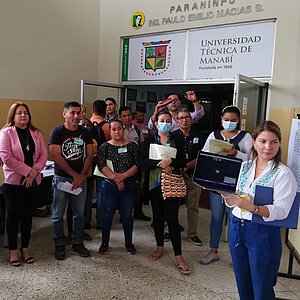Scaling-Up Ecosystem-based Adaptation Through Spreading Knowledge

More than 150 leaders in agricultural extension services, as well as key representatives from institutions, in Costa Rica, Ecuador and Guatemala participated in the Training of Trainers (ToT) course on Ecosystem-based Adaptation in 2023.
The 80-hour training course was developed by IKI´s Scaling up Ecosystem-based Adaptation programme. The training aims to strengthen the technical know-how and skills needed to facilitate the changes required to support local adaptation strategies and thus increase the resilience of vulnerable people and ecosystems. Ecosystem-based Adaptation (EbA) aims to reduce the vulnerability of people to the harmful impacts of climate change by using nature as part of an overall climate adaptation strategy. EbA measures contribute to the implementation of local and national adaptation strategies as well as to managing biodiversity and ecosystem services that increase the resilience of rural landscapes. EbA actions improve the wellbeing of rural communities, reducing their vulnerability to different hydroclimatic extremes while also contributing to ecosystem services provision at the landscape level.
Closing capacity gaps
Closing capacity gaps is crucial for bringing EbA to scale and accelerate the implementation of adaptation strategies. Therefore, the ToT model was chosen to build a pool of competent trainers who can teach EbA knowledge to other practitioners and stakeholders. One common barrier is the lack of awareness of the role of ecosystem conservation, restoration and sustainable management in fostering climate resilience.
The ToT course on EbA was designed to enhance the capacities of key stakeholders in effectively planning, implementing and monitoring EbA measures as part of an overall adaptation strategy and so facilitate the vertical and horizontal scaling up of EbA. Identified knowledge gaps that are filled through the TOT include:
- locally-specific climate risks and vulnerability,
- the link between climate change, nature conservation and adaptation for people and their livelihoods ,
- how to strengthen the level of organisational and individual capacity to plan and implement EbA actions,
- knowledge on mechanisms regarding how to include adaptation in current planning tools,
- tools to monitor and evaluate the performance of adaptation projects.
The course introduced the EbA mainstreaming cycle and considered key crosscutting topics relevant for scaling-up such as governance, gender responsiveness and inclusion.
Participants were selected based on their previous experience in facilitating change processes in agricultural extension services and biodiversity conservation as well as leadership and training practice. Participants were chosen from both the conservation and agricultural field to foster multisectoral dialogue – a key factor in rural sustainable development.
Participation of women in this training was explicitly encouraged in order to increase the number of women trainers in agricultural extension services as well as strengthen the role of women in decision-making structures. In the case of Costa Rica and Ecuador, there was gender parity amongst participants. In Guatemala, only 28% of the participants were women. Incentives to improve women’s participation in the 2024 ToT, such as awareness raising on the benefits of training or providing gender-sensitive delivery mechanisms that match rural women’s needs, were established.
Beyond the classroom
At the end of the course, the multipliers were able to present the EbA approach effectively and lead activities which reinforce learning. For example, in Costa Rica, one of the multipliers, Andrés González, responsible for citizen engagement at the Tortuguero Conservation Area, used the knowledge acquired in environmental education workshops for a group of 22 participants between the ages of 9 and 16.
By 2025, the goals are to reach 280 trainers from government extension services, technicians from municipalities, NGOs and training institutes across the three countries, which will allow the training topics to transcend the classroom and achieve the expected results: a network of multipliers to scale-up and accelerate the effective implementation of EbA actions at landscape level and foster climate resilience in rural areas of Latin America.
The link has been copied to the clipboard
Contact
IKI Office
Zukunft – Umwelt – Gesellschaft (ZUG) gGmbH
Stresemannstraße 69-71
10963 Berlin














